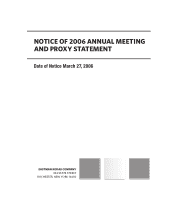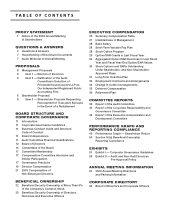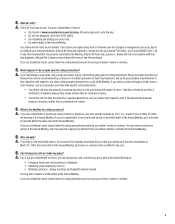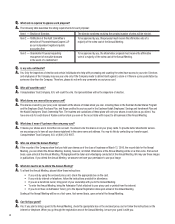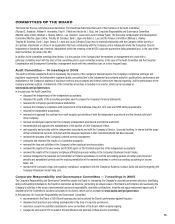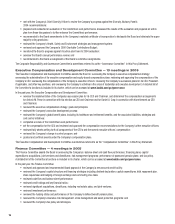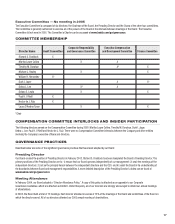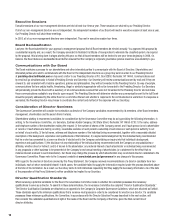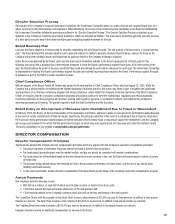Kodak 2005 Annual Report Download - page 165
Download and view the complete annual report
Please find page 165 of the 2005 Kodak annual report below. You can navigate through the pages in the report by either clicking on the pages listed below, or by using the keyword search tool below to find specific information within the annual report.9
SUPPORTING STATEMENT
Like many companies, Kodak has a system of incentive compensation intended to encourage its executives and management to work enthusiastically
in Kodak’s interest. Incentive compensation can be a useful way to reward and motivate senior executives, but we believe that such compensation
should be tied closely to the actual attainment of pre-set performance goals. We are concerned that this may not be happening at Kodak.
In March 2005 the Company announced that fi nancial statements for the quarters and full year of 2003, as well as for the fi rst three quarters of 2004,
could no longer be relied upon and that results would be restated. The restatements lowered 2004 net income by $93 million from prior projections to
$1.94/share from a projected $2.05-$2.15/share. Net income for 2003 was reduced by $253 million, from $0.92/share to $0.88/share.
In light of these restatements, it appears that performance-based bonuses and equity awards to senior executives might have been lower had they
been calculated on the basis of restated results. For example, former Chairman and CEO Daniel A. Carp received a total of $4 million in bonuses and
180,000 stock options in 2003 and 2004 before the restatements were announced.
In our view, this generosity is diffi cult to square with the Company’s performance, which has lagged the S&P 500 Index and its peers in the Dow Jones
U.S. Recreational Products Index for the one-, three- and fi ve-year periods ending November 23, 2005.
In our view, supposedly performance-based payments that rest on results that are restated downwards constitute undeserved compensation. We see
no excuse for such over-compensation, and we believe that the Board of Directors should have a policy of reviewing any such payments in the event of
a restatement and undertake to recoup money that was not earned or deserved.
To our knowledge, the Kodak Board has not publicly stated whether it agrees with this approach or whether it intends to investigate and seek to
recoup funds paid to senior executives to the extent that performance targets were not met in years where results were restated. We regard this
omission as serious.
It is not enough for Kodak’s compensation system to encourage good work. It needs also to discourage bad work and misstatement of results.
Please vote FOR this resolution.”
BOARD OF DIRECTORS’ POSITION
The Board of Directors recommends a vote AGAINST this proposal for the following reasons:
The Compensation Committee of the Board, which is composed solely of independent directors, sets executive compensation in a manner it believes
to be in the best interests of the Company and its shareholders. The Board agrees that a review of executive performance-based compensation is
appropriate when results are restated due to fraud or misconduct. The Board has therefore adopted a policy that addresses the fundamental concerns
raised by the proposal as well as the Sarbanes-Oxley Act of 2002.
In contrast, the shareholder proposal adopts an overly mechanistic approach to the issue. The proposal would apply to any form of restatement,
regardless of its cause and would penalize all senior executives, regardless of their role in, or contribution to, the restatement. Further, it would be
diffi cult or impossible to implement some aspects of the proposal because it is vague in some respects.
The Board of Directors believes that the adoption of the proposal is unnecessary because the Board has already adopted a policy that addresses the
concern raised by the proposal without mechanistically recouping bonuses in unwarranted circumstances. Under the policy, which is posted on our
website at www.kodak.com/go/governance, we will require reimbursement of a certain portion of any bonus paid to named executive offi cers where:
a) the payment was predicated upon the achievement of certain fi nancial results that were subsequently the subject of a restatement;
b) in the Board’s view the offi cer engaged in fraud or misconduct that caused or partially caused the need for the restatement; and
c) a lower payment would have been made to the offi cer based upon the restated fi nancial results.
In each such instance, the Company will, to the extent practicable, seek to recover the amount by which the individual offi cer’s annual bonus for the
relevant period exceeded the lower payment that would have been made based on the restated fi nancial results, plus a reasonable rate of interest.
For purposes of this policy, the term “named executive offi cers” has the meaning given that term in Item 402(a)(3) of Regulation S-K under the
Securities Exchange Act of 1934 and the term “bonus” means a payout under the Company’s Executive Compensation for Excellence and Leadership
(“EXCEL”) Plan.
The Sarbanes-Oxley Act of 2002 already requires that in the case of accounting restatements due to the issuer’s material non-compliance with any
fi nancial reporting requirement under the securities laws due to misconduct, the company’s chief executive offi cer and chief fi nancial offi cer must
reimburse the company for any bonus or other incentive-based or equity-based compensation and profi ts from the sale of the company’s securities
during the 12-month period following initial publication of the fi nancial statement that had to be restated.
The proposal is fundamentally fl awed because of its mechanistic approach. Under the proposal, the Board would be required to recoup all bonuses and
awards to executive offi cers without regard to the relevant facts and circumstances present in a particular case, including whether the restatement
was merely due to a change in accounting pronouncements. Restatements often correct miscalculations or unintentional errors. Recoupment of senior
executive bonuses is not warranted in such cases.


